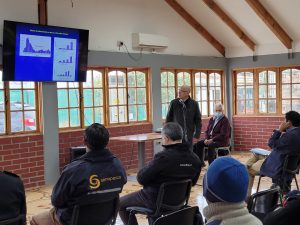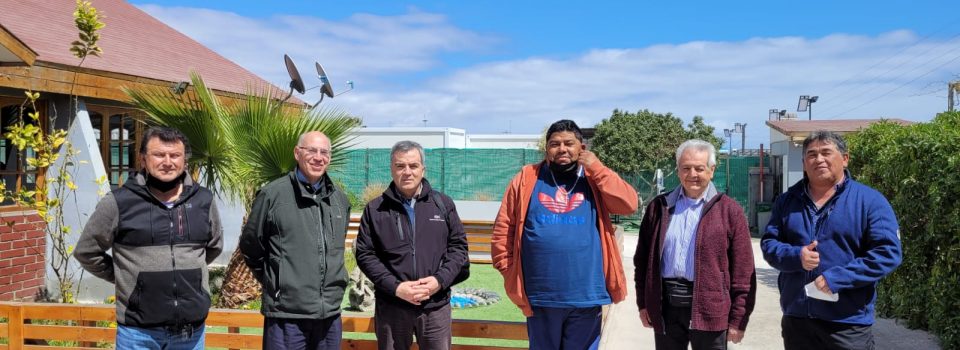Working together: Analysis and proposals related to the harpoon swordfish fishery expanded workshop.
October 14th, 2022 The workshop was held in Caldera port it was organized by the Chilean National Artisanal Fishermen Confederation (CONAPACH), the Interregional Pelagic Federation Changos del Norte and Northen Macrozone Artisanal Fishermen Organizations, this meeting was attended by more than 60 participants from the artisanal fishing sector, representatives of Fisheries Undersecretariat, Fisheries Development Institute, National Fisheries Service, Chilean Navy and regional authorities. The event began with welcome greetings from Mr. Miguel Avalos, Caldera’s COOPESCADORES president and via telematics, Mrs. Zoila Bustamante, CONAPACH president who pointed out this workshop’s relevance . The same was expressed by Mr. Miguel Vargas, Atacama Region’s Governor, Mrs. Brunilda González, Caldera’s Mayor and greetings from Port of Caldera’s Captain, regional representatives from Fisheries and Aquaculture Undersecretariat , National Fisheries and Aquaculture Service and Fisheries Development Institute.
The workshop was held in Caldera port it was organized by the Chilean National Artisanal Fishermen Confederation (CONAPACH), the Interregional Pelagic Federation Changos del Norte and Northen Macrozone Artisanal Fishermen Organizations, this meeting was attended by more than 60 participants from the artisanal fishing sector, representatives of Fisheries Undersecretariat, Fisheries Development Institute, National Fisheries Service, Chilean Navy and regional authorities. The event began with welcome greetings from Mr. Miguel Avalos, Caldera’s COOPESCADORES president and via telematics, Mrs. Zoila Bustamante, CONAPACH president who pointed out this workshop’s relevance . The same was expressed by Mr. Miguel Vargas, Atacama Region’s Governor, Mrs. Brunilda González, Caldera’s Mayor and greetings from Port of Caldera’s Captain, regional representatives from Fisheries and Aquaculture Undersecretariat , National Fisheries and Aquaculture Service and Fisheries Development Institute.
The cycle of talks began with the presentation “Swordfish status of fishery in South Eastern Pacific Ocean”, by researcher Patricio Barría, who pointed out that at national level this resource status is healthy. He also mentioned that a macro-scale swordfish stock assessment in the eastern South Pacific Ocean is being developed by the Inter-American Tropical Tuna Commission (IATTC). This research has had support and scientific cooperation of Chile and the coastal countries and incorporates information from deep-sea fleets, Japan, Taiwan and the European Economic Community. The researcher Hernán Miranda spoke about “State and progress of Taltal and Caldera workshops reached commitments” and made a historical joint work review of all the work that has been carried out for more than a decade, between IFOP and fishermen’s organizations. craft, with the purpose of making the harpoon fleet visible in swordfish fishery. He indicated that IFOP’s work methodology is field implementation of “Working together” approach, developed by Elinor Ostrom, Nobel Prize winner in economics, who points out a way to avoid the “Tragedy of the common goods”, as This is the case of fisheries. He mentioned that during 2018 an important milestone was reached by the Fisheries Administration consisting of the regularization of more than 120 artisanal vessels in the harpoon swordfish fishery and 754 vessels that participated in the cuttlefish fishery. Currently, the harpoon fleet that participates in swordfish fishing exceeds 1,000 enabled and active vessels along the coast from Arica to Valdivia.
Mr. Claudio Ramírez, of Sernapesca Atacama Director(s) spoke about the “National Albacora Fishery Regulation”, in which he referred to the dimensions of the gillnet, made comparisons in which a network can contain an area of six blocks of a city and operational difficulties that the Service has to carry out the inspection of the network fleet.
Another presentation was made by Mr. Juan Santibáñez, from Fisheries Undersecretariat and Aquaculture and verse on “Regulations to apply restrictions to imports according to the Protection of Marine Mammals of the United States Law”, he pointed out the importance of using devices to reduce, if not prevent, bycatch of marine mammals and cetaceans. In addition, he emphasized of artisanal fishing sector and the country opportunities for supporting this initiative since it would allow having the swordfish fishery certified in the future to have access to the North American market and avoid the closure of access to this market.
Finally, Javier Rivera from Fisheries Undersecretariat spoke about “The 20 support measures committed to artisanal fishing”, which are part of government program priorities. In addition, he mentioned that workshops with the fishing sector at the local, regional and national levels should be initiated to advance in the elaboration of a new fishing law.
At the end of the workshop, there was an expanded conversation to analyze the proposals related to the harpoon swordfish fishery, in order to address in a participatory manner the sustainability strategies of the fishery in the national and international regulatory framework.
The main agreements of the workshop were the following:
IFOP must design and implement a sampling system at the local and regional level of the harpoon fleet to generate scientific information on swordfish fishery with the purpose of advising the National Fisheries Administration, fisheries development and providing regional technical assistance. and nationally oriented to food security.
At the international level, strengthen our participation in the Inter-American Tropical Tuna Commission (IATTC), strengthen its national sampling system for the swordfish fishery, regularly send the information that this organization requires, and strengthen its team of researchers.
On the other hand, the artisanal fishing sector commitment with the Monitoring of Highly Migratory Biological Fisheries Resources project consists of supporting IFOP staff, giving access to data collection at the docks and on board their vessels and active participation in new technologies incorporation(such as the use of “pingers”) to avoid marine mammals incidental capture .
Regarding inspection and control, the artisanal fishermen mentioned that harpoon fishing is a highly selective fishing system, with a low volume of landings, used ancestrally by native coastal peoples and currently by the communities of artisanal fishermen.
In relation to the fishing administration, the urgency of systematizing the national list of artisanal fishery and new hydrobiological species inclusion was mentioned; to implement in short term a system of vacancies replacement due to expiration and improve replacement of vessels regulations. In relation to fishing development, support artisanal fishermen cooperatives and their products commercialization lines, seed capital strengthening and technical assistance for entrepreneurs; provide support funding for caletas’s management and support rural caletas production through new infrastructure development.
Finally, Fisheries and Aquaculture Undersecretariat invited all artisanal fishermen to participate in territorial dialogues that will take place from the last quarter of the current year, to discuss a new fishing law contents of.
